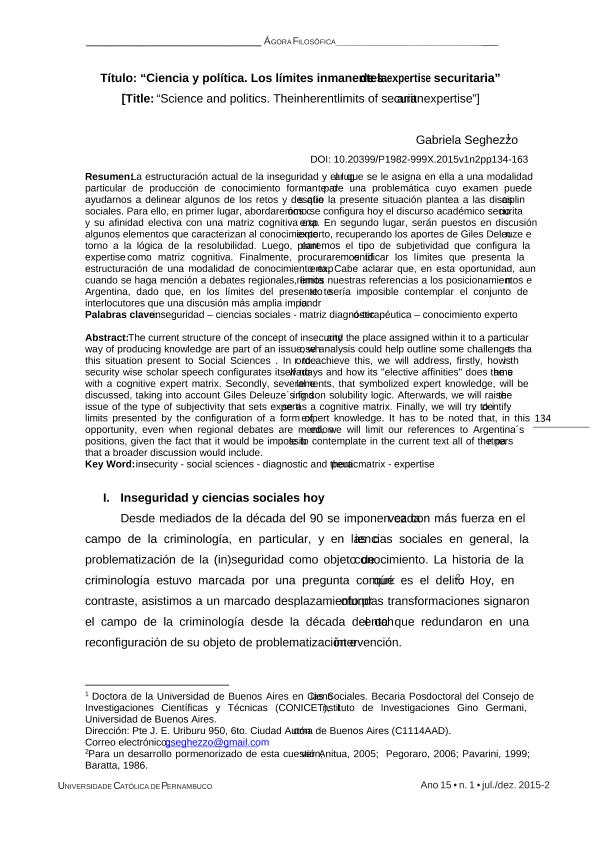Mostrar el registro sencillo del ítem
dc.contributor.author
Seghezzo, Gabriela

dc.date.available
2020-06-02T17:44:11Z
dc.date.issued
2016-06
dc.identifier.citation
Seghezzo, Gabriela; Ciencia y política. Los límites inmanentes de la expertise securitaria; Universidade Católica de Pernambuco; Ágora Filosófica; 15; 1; 6-2016; 134-163
dc.identifier.issn
1679-5385
dc.identifier.uri
http://hdl.handle.net/11336/106501
dc.description.abstract
La estructuración actual de la inseguridad y el lugar que se le asigna en ella a una modalidad particular de producción de conocimiento forman parte de una problemática cuyo examen puede ayudarnos a delinear algunos de los retos y desafíos que la presente situación plantea a las disciplinas sociales. Para ello, en primer lugar, abordaremos cómo se configura hoy el discurso académico securitario y su afinidad electiva con una matriz cognitiva experta. En segundo lugar, serán puestos en discusión algunos elementos que caracterizan al conocimiento experto, recuperando los aportes de Giles Deleuze en torno a la lógica de la resolubilidad. Luego, plantearemos el tipo de subjetividad que configura la expertise como matriz cognitiva. Finalmente, procuraremos identificar los límites que presenta la estructuración de una modalidad de conocimiento experta. Cabe aclarar que, en esta oportunidad, aun cuando se haga mención a debates regionales, limitaremos nuestras referencias a los posicionamientos en Argentina, dado que, en los límites del presente texto sería imposible contemplar el conjunto de interlocutores que una discusión más amplia impondría.
dc.description.abstract
The current structure of the concept of insecurity and the place assigned within it to a particular way of producing knowledge are part of an issue, whose analysis could help outline some challenges that this situation present to Social Sciences . In order to achieve this, we will address, firstly, how this security wise scholar speech configurates itself nowadays and how its "elective affinities" does the same with a cognitive expert matrix. Secondly, several elements, that symbolized expert knowledge, will be discussed, taking into account Giles Deleuze´s finding son solubility logic. Afterwards, we will raise the issue of the type of subjectivity that sets expertise as a cognitive matrix. Finally, we will try to identify limits presented by the configuration of a form of expert knowledge. It has to be noted that, in this opportunity, even when regional debates are mentioned, we will limit our references to Argentina´s positions, given the fact that it would be impossible to contemplate in the current text all of the partners that a broader discussion would include.
dc.format
application/pdf
dc.language.iso
spa
dc.publisher
Universidade Católica de Pernambuco
dc.rights
info:eu-repo/semantics/openAccess
dc.rights.uri
https://creativecommons.org/licenses/by-nc-sa/2.5/ar/
dc.subject
INSEGURIDAD
dc.subject
CIENCIAS SOCIALES
dc.subject
CONOCIMIENTO EXPERTO
dc.subject
MATRIZ DIAGNÓSTICO-TERAPÉUTICA
dc.subject.classification
Otras Sociología

dc.subject.classification
Sociología

dc.subject.classification
CIENCIAS SOCIALES

dc.title
Ciencia y política. Los límites inmanentes de la expertise securitaria
dc.title
Science and politics. Theinherentlimits of securitarianexpertise
dc.type
info:eu-repo/semantics/article
dc.type
info:ar-repo/semantics/artículo
dc.type
info:eu-repo/semantics/publishedVersion
dc.date.updated
2020-05-29T20:21:07Z
dc.journal.volume
15
dc.journal.number
1
dc.journal.pagination
134-163
dc.journal.pais
Brasil

dc.journal.ciudad
Recife
dc.description.fil
Fil: Seghezzo, Gabriela. Consejo Nacional de Investigaciones Científicas y Técnicas; Argentina. Universidad de Buenos Aires. Facultad de Ciencias Sociales. Instituto de Investigaciones "Gino Germani"; Argentina
dc.journal.title
Ágora Filosófica
dc.relation.alternativeid
info:eu-repo/semantics/altIdentifier/doi/https://doi.org/10.25247/P1982-999X.2015.v1n2.p134-163
dc.relation.alternativeid
info:eu-repo/semantics/altIdentifier/url/http://www.unicap.br/ojs/index.php/agora/article/view/721
Archivos asociados
